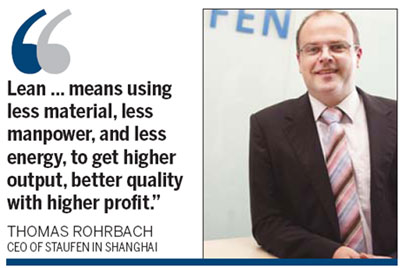Achieving more with less
In China, one of the world's fastest developing countries, Staufen AG, a Germany-based lean consultancy, strives to provide its clients with a mixture of the best of German efficiency and Chinese speed. Both virtues are key ingredients for the successful application of lean manufacturing.
Making manufacturing processes efficient by removing all steps that do not add value to the product from the customer perspective is the essence of the "lean" philosophy.
Staufen AG was established in Shanghai five years ago and began advising clients, mostly in the automotives, machinery, and electronics industries.
Different from other consultancy companies that pay attention to strategic consulting, Staufen focuses on implementation of lean principles. Further expertise is supplier development and the set-up of proper purchasing processes in-line with international compliance rules.
Lean thinking started at Toyota in Japan. This has led to the typical misperception that Lean is a particular japanese culture, which it is not. "Lean is applicable in any culture, in any industry. It means using less material, less manpower, and less energy, to get higher output, better quality with higher profit," said Thomas Rohrbach, CEO of Staufen in Shanghai.
Staufen works for medium sized European companies in China, as well as huge corporations including Volkswagen. A lean transformation changes first the manufacturing processes, and then the company culture, making the whole company a more efficient enterprise, said Rohrbach.
"From our experience, there are mainly two difficulties lying ahead for companies in China. One is cost pressure and the other is insufficient capacity. Staufen can help to deal with both," said Rohrbach.
With increasing quality expectations, China is one of the most competitive markets in the world, and is particularly price sensitive. "Some foreign companies are complaining about the cost pressures, however, in most of the cases the reason is that their operation is in a mess," said Rohrbach.
If you do not start with excellent production and operations systems, it is very likely that your operation in China is not profitable, he added.
According to Staufen's research, foreign-funded companies have between 20 to 30 percent cost disadvantages in comparison with their local competitors. The reason behind this is that some local manufacturers are situated in lower-cost locations, and have much lower overhead costs.
According to Rohrbach, countless examples prove that "lean" works in every industry across the world. Compared to conventional manufacturing, production lead time is typically reduced 50 to 80 percent, quality defects reduced by 80 percent, and productivity increased by 50 to 80 percent, and 50 percent space can also be saved.
A Shanghai-based electronic company increased productivity by 45 percent after applying lean principles and saved up to 60 percent space as well as 30 percent of throughput time, according to Staufen.
Staufen can provide advice to help clients overcome any problems with their operations.
"We will start with a short analysis to understand the clients' situation and their pain points. If those pain points are identified, Staufen will design a 12-week project," Rohrbach said.
For the client, the twelve-week-projects are not off-site training, but solving of a specific problem at hand. The best way of learning is learning by doing. Therefore, the methods and tools are taught and learned on-the-job, applied to an actual case. The client team typically consists of 6-8 managers of different functions.
When Lean is applied properly, workers can work more smoothly and supervisors can more easily control and manage people. For management levels, there will be more transparency and flexibility.
Started 15 years ago, Staufen is now the largest German lean consultancy , with offices in China, Switzerland, Poland, and Italy.

(China Daily 05/19/2010 page19)














